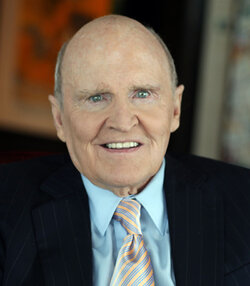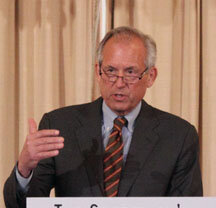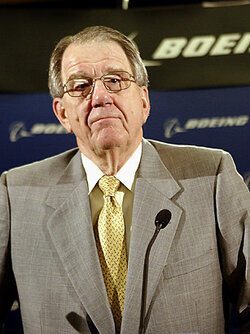This is going to be a long, autistic post.
First things first and it will be a bit out of sight, but stay with me.
It all starts with one name. Jack Welch. CEO of GE and famous for his strategies. In short. Eager to extract business in the short term, caring more about finance then innovation/products, cuttings costs wherever possible and a rough handling of the employees. His nickname was "Neutron Jack" for the reasons that after "his restructuring" the buldings were left empty without human beings, the former employees. Now in the long term, this could be a disaster and in case of GE, it was. But Jack Welch did another thing:
He taught his stragegy to future CEOs and executives.
Back in the day, in the 90ths the trouble began. If you remember something about financial history you know that it was the thing during that time to grow your company by just acquiring more and more companies. Growth though this was "easy" and usually by removing double positions the company became usually more efficient. Then.
Boing aquired McDonnell Douglas in 1997. CEO there was back at the time Harry Stonecipher,
a former GE executive who studied at Welch’s knee.
What did Stonecipher do at McDonnell Douglas? Slashing costs and neglecting investment. Okay in the short term, bad in the long term. Its main factory in Long Beach, California, badly needed repairs. Quality issues with the airplanes were common. And they hired lots of Engineers if they needed to meet a deadline. After the deadline? Those same people got fired. Genius, I know.
As Boeing aquired McDonnell Douglas, Stonecipher became Boeing’s president and chief operating officer and he became of one the largest shareholders since Boeing bought the company entirely with its own stock. He had a shitload of shares in McDonnell Douglas and could now turn those into Boeing shares. Suddenly that guy had influence within Boeing and he wasn't even the CEO.
The changes were quick:
- Tougher line with the Union
- Boeing said it would slask 53,000 jobs
- Boeing would embrace outsourcing
- Launching a buybackprogram for it's own shares
- In 2001 Boeing relocated it's headquarters to Chicago, far away from it's main factories. Reason? Tax breaks and subsidy battles between administrations. Also the believe that the management would make better decicions if they were far away from the rank and file peons
CEO back at the time of Boeing was Philip Murray Condit. He was taking the fall after another Boeing executive who had come over from McDonnell Douglas was caught in a government procurement scandal. Then Stonecipher became CEO.
Good luck was that he couldn't keep it in his pants. So Stonecipher was gone after an affair with a subordinate. In came James McNerney. Guess his background.
GE executive under Welch.
His biggest crime was introducing a new compensation scheme. Manager compensation would not only be tied to the stock price, but also to the business units performance. Maybe well intended, it had the effect that managers were not thinking about creating a great and safe plane, nah. It was now also in focus to see where there is room to pinch pennies. At first this was working out. Efficiency improved, but the consequences for the future were planted.
But there was more:
- Slashing the employee pension plan
- Slashing wages
- Pressuring suppliers to reduce prices or else they would end up on a "no fly list" with Boeing
Boeing even opened up a factory in South Caroline. The the state with the lowest union representation in the nation. Now there was no historic aviation manufacturing base in South Carolina. None.
Prior you had someones Dad working all his life for Boeing and then the son. The knowledge of the Dad was not even gone after he retired since the son could consult his Dad on issues. That is so valuable, that I will not even attempt further to put it into words. For the Executives? Just costs, who cares about everything else.
I just realized there is a whole wikipage about that factory and it's issues:
There they build the Boeing 787 Dreamliner. The plane that was delayed and had massive cost overruns. So that lead James McNerney to not go with a new design but to redesign the 737 again. A fateful decision that would bind Boeing for decades.
Then came a non GE/Welch CEO. Dennis Muilenburg. An engineer, and someone from inside Boeing, maybe a new start? Nah. McNerney in several GE executives who had worked with Welch. Dave Calhoun as one example. Later Kevin McAllister, though that one was hired by Muillenburg. But the "GE mindset" and management style was now heavily ingrained into the company. Now the redesign had the following issue:
Back in the day, when the 737 was designed (around 1960). The frame of the airplane and engines were smaller. The whole plane sat low to the ground. The new fuel-efficient engines were large, much larger than the previous designs. There was no easy solution to make the plane sit higher to the ground. The engines would scrape the runway if they placed them at the same place. So the decision was made to place the engines further forward on the wings. A consequential decision.
In the wind tunnel test, they saw it. The plane’s nose tended to pitch upward in certain extreme turns. The solution was a software fix know as the Maneuvering Characteristics Augmentation System, or MCAS.
When the plane’s sensors detected that the nose was pitching up, the software would automatically push the nose down. There was one critical error. The sensor measuring the planes pitch was only connected with one metal wire.
A single point of failure.
Now. They could add a little light notification for that MCAS system in the cockpit. Teach pilots and issue would be reduced. They did not. Why? Guess:
Boeing wanted to pitch to airlines the offer that pilots who flew the Boeing 737 Next Generation, the prior version, would be able to handle the Max without extensive new training. Yes again. Cust cutting, since training is expensive. They even sold it like this:
Southwest Airlines would be paid 1 million for each plane, if the pilots needed simulator training.
Then on October 29, 2018 - Lion Air Flight 610 took off from Jakarta with 189 people aboard. Without warning, the nose of the Max would suddenly dip. The pilots tried to counteract but the plane would dip it's nose towards the ocean below time and time again. Shortly after takeoff - the plane plunged into water. Nobody survived.
Did the crash change anything? Not really. Lion Air Flight had a bad reputation for shit training and it could just be a unfortunate accident. Also nobody cared when some stinky brown people and niggers parish, let's be real. The flight recorder though gave hints that the MCAS system had played a role in the crash.
Well, they didn't grasp the issue. But they increased their dividends by 20 % shortly after.
Then, on March 10, 2019. Another plane started from Addis Ababa, Ethiopia to Nairobi, Kenya. A popular flight with diplomants and aid workers from the U.N. 157 people were aboard, many of them on their way to a United Nations environmental conference. Six minutes after takeoff, the plane crashed into a remote field, all 157 people died.
Now white people and important once at that died, not some peasant. So the attention was on and the issue with the MCAS was found out. That lead to the grounding of all the planes and it has been downhill after that.
But I already typed too much.
For me it is a mangement issue. Not DIE shit. Welch, Stonecipher and McNerney are all white. This is just where to spend money and it all went to the shareholders instead. The cashlow into dividends and buybacks in the years prior in percentage of the operating income is insane. They could have innovated, controlled, make sure. They choose not to.
It is not DEI, which retards
@User names must be unique believe and see the root cause for everything. These are the people responsible:



Look white to me.
Also a sincere kill yourself to everyone thinking that "whistleblower" was killed in some conspiracy. He came out in 2024. 2024 ffs. This is all known. I am not even mentioning recent issues. He comes out with the incredible take:
"They neglected safety in favor of cost cutting"
After 2 planes crashed
After several investigations
After the planes were grounded twice at airports
After books were written about the topic
After the Alaska door incident
Yeah sure. He had such important stuff to tell that he had to go. He of all people. Is media literacy really that low? Holy fuck, nigger-tier take.







